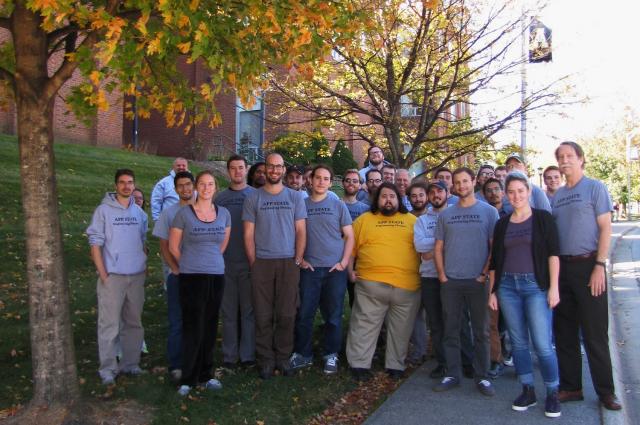Engineer a career-ready degree.
We are Problem Solvers.
The M.S. degree program in Engineering Physics at Appalachian State University offers hands-on, laboratory-based courses that prepare students for entry into industry or a Ph.D. program. We work closely with our industry partners to ensure that our curriculum is modern and relevant. Graduates of this program tend to have tremendous flexibility in their careers because they can bridge the gap between scientists, engineers, and technicians, which make them highly valuable to companies and research labs. Most of our courses incorporate a three-hour, hands-on lab. These courses provide a vast amount of experience for the students so that they are well prepared for future endeavors.
We are Professionals.
A hiring manager, responsible for employing many of the MS Engineering Physics students, once said, "Overall, I’ve been impressed by the graduates that have come to interview. It is rare we see someone from a different program that competes with the experience and professionalism that you and your team are able to develop with your students."
20% of our curriculum is dedicated to experiential learning and professional development.
We are in High-Demand.
We pride ourselves that job placement from the program is very high. Our students are encouraged to begin their job search prior to graduation:
- 88.2% received an offer before graduation,
- 100% received an offer within two months of graduation, and
- Many graduates receive multiple offers.
The total employment rate within six months of graduation was 97.0% in the last several years and the average starting salary is approximately $90,000 +/- $15,000 per year.
The M.S. Engineering Physics program has been hailed by the American Institute of Physics (AIP) as among the list (unranked) of the top 13 programs of Masters-granting institutions nationwide [PDF]. Our graduate faculty - those that teach and/or do research with graduate students - includes Dr. François Amet, Dr. Michael Briley, Dr. Anthony Calamai, Dr. Daniel Caton, Dr. Sid Clements, Dr. Tonya Coffey, Dr. Brooke Hester, Brad Johnson, Dr. James Sherman, Dr. Roshani Silwal, and Dr. Chris Thaxton. The faculty have extensive experience in industry, government agencies, and academics in fields ranging from electrostatics for NASA missions, to nano-scale materials characterization, stellar and Earth atmospheric studies, granular flows and fluid dynamics, atmospheric physics, biophysics, and optics. Primarily, the graduate curriculum and graduate student projects are focused on problem solving through the study, design, debug and delivery of instrumentation and automation solutions for manufacturing and robotics, characterization / defect testing and analysis, research and product development, and control systems in the built environment.
The Curriculum
We offer three concentrations:
- Systems and Laboratory Automation: The Systems and Laboratory Automation specifically focuses on developing the students’ hands-on practical and theoretical training in electrical and software engineering for automation and robotics.
- Professional Science Master's (PSM) Concentrations. The PSM degree is a graduate degree that combines advanced training in science and engineering while simultaneously developing workplace skills that are highly valued by employers.
To learn more about our concentration options, visit our concentrations website.
Accelerated Master's Program
The Department of Physics and Astronomy has an Accelerated Master's program which allows high-achieving seniors to take graduate level courses their senior year. These courses can double count for both the undergraduate BS Physics degree and the graduate MS Engineering Physics degree. Students in this program need only one additional year past the bachelors to earn their master’s degree.
For more information about our Accelerated Master's Program, please email Dr. Mike Briley (brileymm@appstate.edu) with questions.
Apply
Application for admission to our programs is open to any graduate of an accredited college or university who holds a bachelor's degree in physics, engineering, computer science, electronics, mathematics, or a related area. The GRE can be waived for students that have a B average in their core Physics and Mathematics courses.
- Apply to our program
- Graduate Bulletin
- App State Undergraduates Interested in Accelerated Master's (Note: The GPA requirement is 3.2.)
- Tuition and Fee Schedules
- Cratis D. Williams Graduate School
Check us out on Facebook: http://www.facebook.com/ASUEngineeringPhysics
For more information, contact the Program Director, Dr. Michael Briley (brileymm@appstate.edu).

PHY 5740 Sensors and Transducers